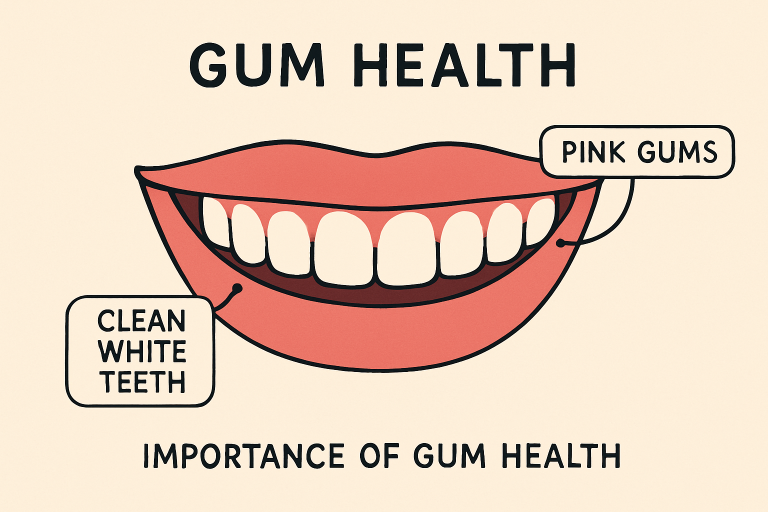
Maintaining healthy gums is a crucial cornerstone of oral health, affecting not only the brightness of your smile but also your overall well-being. Gum disease can quietly progress for years, often with very subtle signs, causing discomfort, tissue loss, and eventually jeopardizing the integrity of your natural teeth. Furthermore, research now links periodontal health to conditions such as heart disease, diabetes, and respiratory illnesses, underscoring the importance of gum care. Fortunately, most cases of gum disease are preventable with smart daily habits, timely professional care, and making informed choices. If you’re seeking trusted advice or require professional assistance, consult a periodontist Levittown NY, to begin your journey with expert care tailored to your specific needs. By staying proactive, you take a significant step toward safeguarding both your smile and long-term health.
Healthy gums are supported by what you do every day, from brushing and flossing to the food you eat. Your lifestyle choices create the foundation for oral health. Understanding the steps to prevent gum disease empowers you with knowledge, creating long-term benefits not just for your smile and confidence, but for your comfort and ability to live life to the fullest. Being intentional about these habits can help you avoid the need for extensive treatments later on and maintain your natural teeth for a lifetime.
Daily Oral Hygiene Practices
The foundation of gum disease prevention starts with daily oral hygiene. Consistency and proper technique can stop plaque from taking hold and becoming a threat to your gum tissue. Plaque is a sticky, colorless film of bacteria that forms on the teeth, and if left unchecked, it can irritate your gums and lead to inflammation known as gingivitis—the earliest stage of gum disease. It can harden into tartar in as little as 24–48 hours, which can only be removed by a dental professional.
- Brushing: Use a soft-bristled toothbrush and fluoride toothpaste at least twice a day. Brush along the gumline to dislodge bacteria and ensure you’re treating both teeth and gums. Electric toothbrushes may provide additional benefit for those who struggle with manual brushing or for people with limited dexterity, as they can remove more plaque in hard-to-reach areas. Don’t rush—spend at least two minutes brushing each time.
- Flossing: Daily flossing reaches the spaces between teeth and the curve of the gumline, areas vulnerable to plaque and bacterial buildup. Skipping this step leaves nearly half of your mouth uncleaned, as toothbrush bristles can’t reach in between teeth effectively. Gently curve the floss in a “C” shape around each tooth and slide it beneath the gumline for the best effect.
- Mouthwash: An antimicrobial mouthwash helps reach and rinse away bacteria in spots brushing and flossing may miss. Choose alcohol-free varieties if you have sensitive gums or a dry mouth. Look for options with the American Dental Association Seal of Acceptance for optimal results and added protection against gingivitis and plaque. Swish for 30–60 seconds each time for full efficacy.

Adopting a Balanced Diet
Nutritional choices influence both your gums and your body’s ability to heal and protect itself. Diets rich in vitamins C and D, calcium, and antioxidants foster healthy gums and strong teeth. Vitamin C helps strengthen your immune system and keeps connective tissues healthy, while calcium is critical for maintaining the density of bones that support your teeth. Antioxidants found in foods like berries, nuts, and leafy greens help combat inflammation and promote healing.
Prioritizing fruits, leafy greens, dairy products, and whole grains over processed and sugary items limits the food supply for harmful oral bacteria, thereby reducing your risk of plaque buildup and inflammation. Chewing fresh, crunchy fruits and vegetables, such as apples and carrots, also naturally helps clean teeth. The CDC recommends limiting high-starch and high-sugar products for optimal oral wellness. Additionally, choosing healthy snacks can help you avoid cavities and neutralize acids produced by bacteria in your mouth.
Regular Dental Check-ups
Routine dental visits are crucial for detecting early signs of gum disease—often before visible symptoms appear. Professional cleanings remove stubborn tartar and plaque that toothbrush and floss simply cannot, especially below the gumline. Your dental team will thoroughly examine your mouth for signs of inflammation, bleeding, or recession, and provide tailored advice to improve your home care routine if needed. Early intervention can dramatically reduce the risk of progression to advanced gum disease and tooth loss, while also saving you time and money on more complex treatments.
Most dental professionals recommend scheduling check-ups at least every six months; however, those with a history of gum disease or who are at higher risk may require more frequent visits. Open communication with your dentist or periodontist ensures you catch issues early and stay on top of your gum health.
Healthy Lifestyle Choices
The habits you maintain outside the bathroom can play an equally important role in gum health, influencing your body’s resilience and how well it recovers from minor gum irritations:
- Quit Smoking: Smoking impairs blood flow to gums, weakens your immune response, and increases your risk of infection. Smokers are up to six times more likely to develop gum disease than non-smokers, according to the American Dental Association. Quitting tobacco can reverse some of the damage over time and is one of the most impactful steps you can take for both oral and overall health.
- Limit Alcohol Consumption: Alcohol dries out oral tissues and reduces saliva production, creating an environment that allows bacteria to flourish more easily. Moderation helps keep your gum tissue healthy and resilient, while also reducing the risk of developing other oral health problems, such as mouth sores or oral cancer.
Managing Stress
Chronic stress undermines your body’s defenses and can increase your vulnerability to infections, including those affecting your gums. Stress may cause you to clench your jaw or grind your teeth, which puts additional strain on gum tissue and supporting bone. Relaxation strategies, such as regular exercise, meditation, or creative hobbies, not only enhance mental well-being but also support a healthy immune system capable of combating oral bacteria. Even brief moments of mindfulness throughout the day can lower stress levels and support a healthier mouth.
Staying Hydrated
Water is nature’s rinse, essential for overall wellness and vital for maintaining good oral health. Sipping water throughout the day helps cleanse the mouth of food debris and bacteria, reducing the buildup of harmful substances on your teeth and gums. Hydration also encourages healthy saliva flow, which helps protect both teeth and gums by neutralizing acids and carrying away particles before they turn into plaque. If you struggle with dry mouth due to medications or other factors, consult your dental professional for personalized recommendations.
Conclusion
By practicing diligent daily hygiene, making informed food and lifestyle choices, and maintaining regular dental visits, you put your best foot forward in the fight against gum disease. Healthy gums are within reach—and with even small, consistent changes, you can enjoy a brighter, healthier smile for life. Remember, expert support from dental professionals can guide you with personalized care and recommendations every step of the way.




